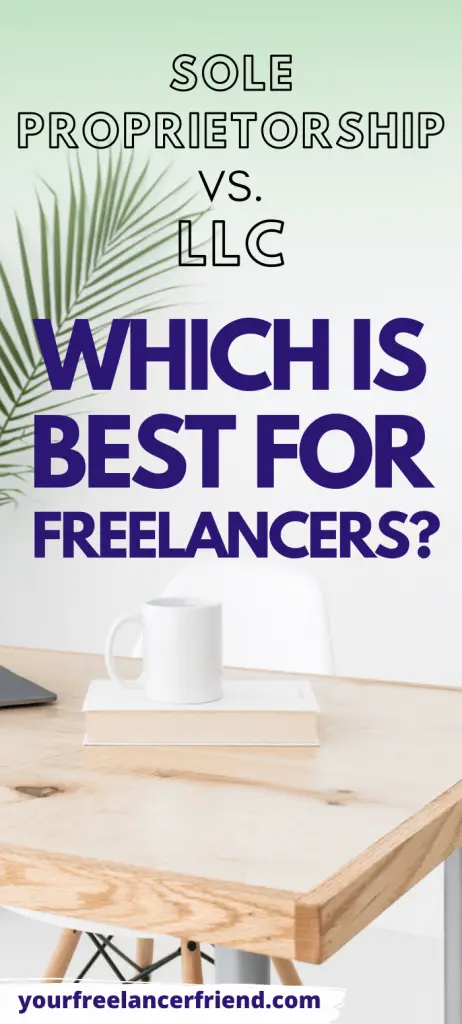Beginner freelancers can get a LOT of bad advice. Take, for instance, the time I called a CPA during my second year as a freelancer and asked her the difference between a sole proprietorship and LLC.
She told me I didn’t need to worry about forming an LLC because I could buy liability insurance that would offer me the same protection.
Um, WRONG! I’ll go into details below regarding sole proprietorships vs. LLCs, but in short, professional liability insurance may cover the costs of hiring an attorney to defend me should I be sued and the judgment should the creditor win—but liability insurance would NOT protect my personal assets like an LLC would. On top of that, if a claim exceeds a policy’s limits, the rest may need to be covered out of pocket. For more information on the differences in liability protection between an LLC and insurance, read this article.

What is a sole proprietorship?
A sole proprietorship is the most basic and simple business structure there is for an American business owner. There is no paperwork to file to become a sole proprietor—the second you start transacting business, you are technically a sole proprietor.
Come tax time, as a sole proprietor, you would file your income tax return the same as always with a few new additions:
- 1099s – These are the forms your clients should send you if they paid you at least $600 during the tax year.
- Schedule C – This is your profit and/or loss from your business
- Schedule SE (Self-Employment Tax)
Although the sole proprietorship is easy and extremely common, it does NOT offer you any liability protection. Legally, there’s no distinction between you and your freelance business. That means, if a client wanted to sue you for a business-related matter, they would sue you personally. And as such, if they won, they could take your personal assets as restitution (e.g., money in your personal savings account, your house, your car, etc.).
What is an LLC?
“LLC” is short for Limited Liability Company, and as its name implies, it limits your liability in the case of a lawsuit. An LLC is a business entity, meaning it’s like its own person. So if a client were to sue you for a business-related matter, it’s likely they would sue your LLC, NOT you personally. And as such, if they won, they could only take your business assets (e.g., money in your business bank account, business laptop, etc.), and they could not touch your personal assets.
Exceptions to LLC liability protection:
- In some cases, even if a client were to sue you for a business-related matter, they may be able to sue you personally too! For example, in defamation lawsuits, the person is often sued, even if they were operating as an LLC when it happened. Read this blog post for more information on contractual vs. tort law and how that affects your LLC liability protection.
- A BIG exception to the LLC protection is “piercing the corporate veil.” This simply means that IF the plaintiff can prove that you were NOT operating your LLC as a true separate business entity, they could pierce its corporate veil and go after you personally. That’s why it’s SO important to follow these guidelines to maintain your LLC’s “corporate veil.”
Sole Proprietorship vs. LLC: The Similarities
- Both can be made up of just one person/freelancer. In fact, you can be a “single-member LLC,” which is taxed by the IRS as a sole proprietorship.
- In the eyes of the IRS, a sole proprietorship AND a single-member LLC are taxed EXACTLY THE SAME! The exception here is that as a single-member LLC, you CAN elect to be taxed as a corporation instead. There are certain advantages to that in some cases, but it’s quite complicated, so we’re not going to go into that in this post.
Wait, Can an LLC Also Be a Sole Proprietorship?
Yes. This is something that’s very confusing for a lot of freelancers—I know it was confusing for me!
Basically, when you think of your business structure, think of it from TWO perspectives:
- Legal: An LLC is a limited liability company.
- Tax: A single-member LLC automatically defaults to being taxed the same way as a sole proprietorship.
So, in short, in the eyes of the law, you are an LLC. But, if you are a single-member LLC, in the eyes of the IRS, you are a sole proprietorship (unless you elect to be taxed as a corporation). Confusing, I know!
Sole Proprietorship vs. LLC: The Differences
- A sole proprietorship offers no liability protection; an LLC separates you (the freelancer) from your business so that if you were sued, barring some exceptions, the plaintiff could not go after your personal assets.
- A sole proprietorship is free and doesn’t require any paperwork to set up; to set up an LLC, you must file “Articles of Organization” with your state and, usually, pay an annual fee to your state.
- A sole proprietorship is taxed as a sole proprietorship by the IRS, which means you file a Schedule C with your 1040 income tax return; a single-member LLC defaults to being taxed as a sole proprietorship, BUT it can elect to be taxed as a corporation instead.
- Sole proprietorships can legally commingle personal and business funds (i.e., you can deposit client checks into your personal bank account, no problem), though it’s not recommended (because failing to keep your business and personal transactions separate can become a headache at tax time!).
LLCs, however, MUST NEVER commingle personal and business assets if they wish to maintain their corporate veil (i.e., you must have a separate business bank account into which you deposit your client checks; NEVER put them into your personal bank account!).
Common MYTHS About Sole Proprietorship vs. LLC
Myth #1: I don’t have any assets to protect, so I don’t need to form an LLC.
A lot of freelancers think that because they’re not rich, they don’t need to be protected from lawsuits. “I’ve got nothing to lose!” they claim.
But that’s a flawed way of looking at it. In reality, if somebody sues you and wins the case, the judgment follows you for years. For example, in California, a judgment lasts for 10 years, and during those 10 years, the creditor can renew the judgment for another 10 years!
So even if you don’t have a house, a car, or cash to protect right now…in 10 years, you might! So it’s wise to go ahead and start protecting yourself with an LLC.
Myth #2: I can form an LLC in Delaware and legally avoid paying any taxes.
No, that’s not how it works. You have to form an LLC in the state(s) where you perform the work. So if you live in Montana and you work from your home in Montana, forming an LLC in Delaware does not relieve you of your obligation to pay income tax to the state of Montana.
Myth #3: I should form an LLC in whatever state is most favorable to me tax-wise.
Nope. See myth #2 above. You should form your LLC in the state or states where you will perform the work.
If You Want the Most Liability Protection, Have Both an LLC and Liability Insurance
Now, I know when you’re a beginner freelancer, it can seem like overkill to form an LLC and buy liability insurance. In fact, when I first started out, I didn’t have either of those things. But, certainly, as you grow and your freelance business becomes your primary income stream, you should definitely consider having both to protect your assets.
So…How Can I Change My Sole Proprietorship to an LLC?
I went through this myself in 2019. I became an LLC! So, check out my ultimate guide to changing from a sole proprietorship to an LLC. It has everything I learned from my own experience!














Add comment